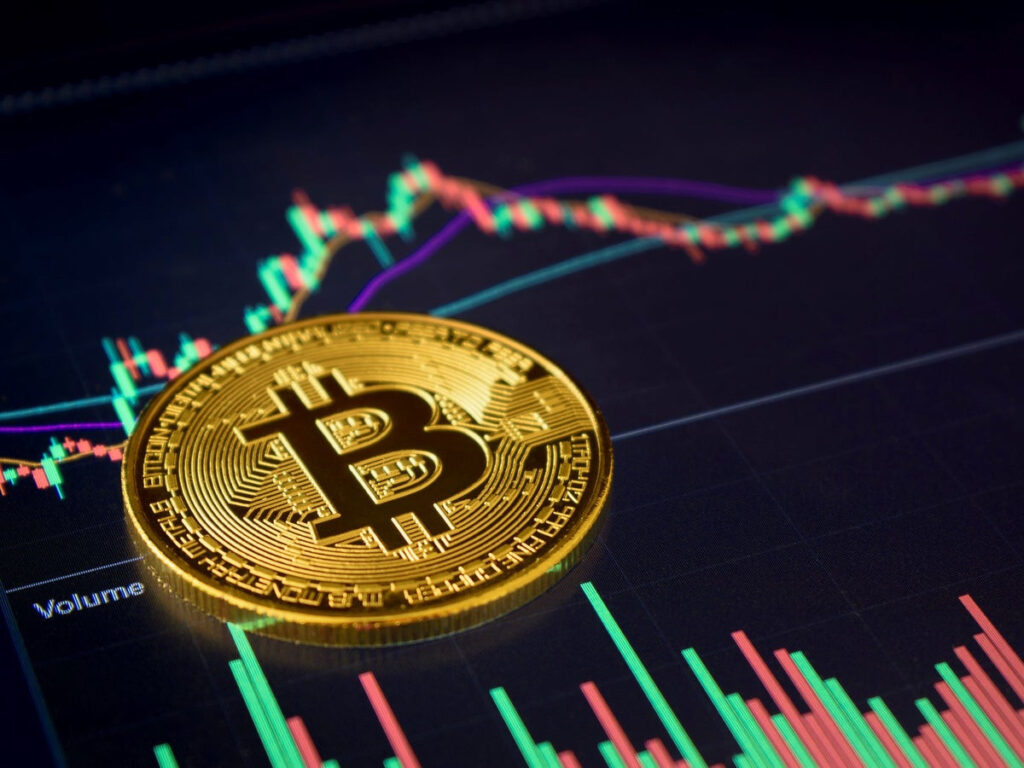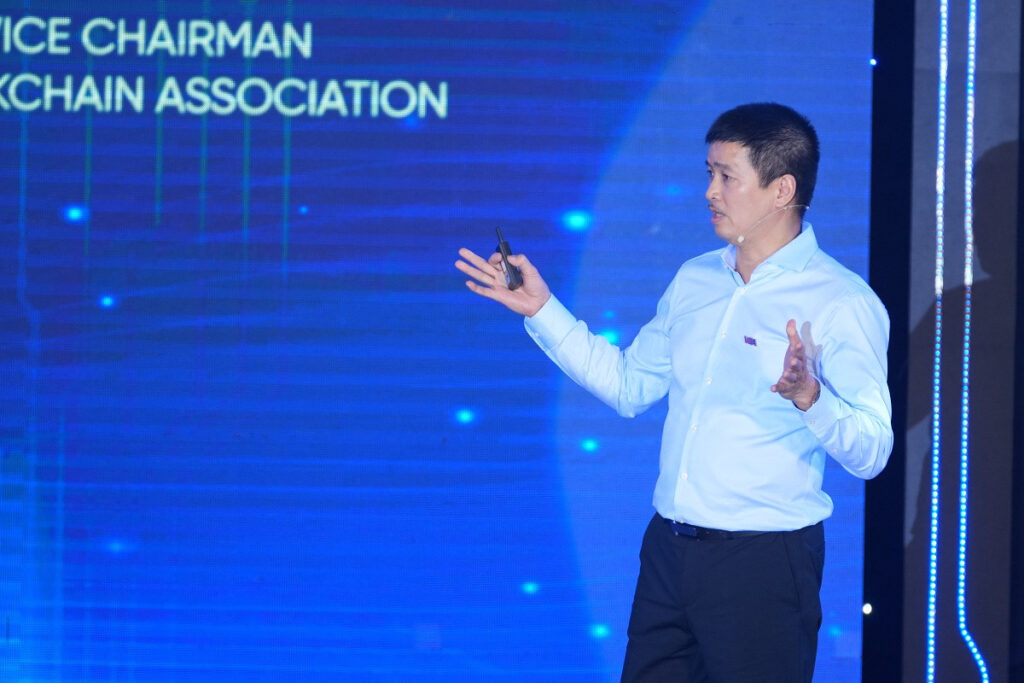Vietnam is a country with vast potential and is taking pioneering steps in technology. However, when it comes to the legal framework surrounding virtual assets, there remains a degree of hesitation. It is essential to promote knowledge dissemination and develop a legal framework that is internationally competitive.
Currently, there are still many conflicting opinions regarding the business activities of virtual and digital assets.
From the perspective of an industry insider, Mr. Phan Đức Trung, the Permanent Vice President of the Vietnam Blockchain Association, had a conversation with VietNamNet to help the public better understand this subject, which many consider “sensitive.”

Virtual Assets to Account for 10% of Global GDP, Equivalent to $16 Trillion by 2030
Virtual assets/digital assets are gradually being accepted in many countries. What about Vietnam, Mr. Phan?
Mr. Phan Đức Trung: According to a survey by the Atlantic Council in December 2023, which covered over 60 countries regarding their policy classification of virtual assets/digital assets, Vietnam is among the 8 countries with a policy that bans virtual assets.
The policy groupings in the survey were divided into three categories: Legal Policy, Partial Ban Policy, and Full Ban Policy. Of the 60 countries surveyed, 32 have a legal policy for virtual and digital assets, 19 have a partial ban policy, and 8 countries have a full ban policy.
Notably, all 10 countries in the G20, which account for 50% of global GDP, are part of the 32 countries that have a legal policy for digital assets.
Vietnam Still Hesitant About Legal Framework for Virtual Assets?
To establish a comprehensive policy on virtual assets, it is essential to approach the issue from three angles: technology, finance, and law. This is a complex challenge that every country worldwide faces when constructing a legal framework.
A statistic released by the Financial Action Task Force (FATF) in 2023 highlights that 75% of countries are still struggling to build a legal framework for Virtual Asset Service Providers (VASPs).
From a technological standpoint, Vietnam has a strong inclination toward pioneering blockchain technology applications for innovative startups. However, the integration of blockchain technology into the traditional economy requires traditional businesses to scale toward global levels or engage in cross-border transactions. A notable issue is that Vietnam currently lacks large enough enterprises that are prepared to leverage and apply this technology at scale.
What Are the Common Misconceptions in Vietnam Regarding Virtual Assets?
Virtual assets, digital assets, cryptocurrencies, and tokens are all different terms used to describe assets that apply blockchain technology. In computer science, they are referred to as “tokens.” Each term, depending on the perspective, brings a different understanding and interpretation. From a risk management perspective, they are referred to as virtual assets (as per FATF), from a taxation standpoint, they are called digital assets (according to IFRS accounting standards), and from a fintech (financial technology) perspective, they are often called cryptocurrencies.
In Vietnam, the most common term used is virtual assets. This approach aligns with the risk management criteria set by the FATF and is widely accepted globally. From this perspective, we have fundamental definitions such as Virtual Asset (VA) and Virtual Asset Service Provider (VA-VASP). However, due to the lack of widespread knowledge, many people mistakenly interpret virtual assets as something that is non-existent, worthless, or inherently bad.
Therefore, I believe that alongside the establishment of a comprehensive legal framework for VA-VASP, we must also promote the correct understanding that a token is a blockchain-based technology product and represents a new asset class that has existed since Bitcoin’s inception in 2009.
This asset class has both positive and negative aspects, just like any other asset in the world. What we need to do is learn how to manage it, recognize opportunities, and understand the risks in the future.
I also want to emphasize that the emergence and development of this asset class is irreversible. It is estimated that the size of virtual assets will account for up to 10% of global GDP, equivalent to $16 trillion by 2030, according to a report from the Boston Consulting Group (BCG).

Don’t be afraid, avoid, or separate from the global trend
Many people are concerned that the development of virtual assets could pose risks and negatively impact human rights, and even national security. Do you agree with this concern, and do you have any further recommendations?
As I’ve mentioned, virtual assets or cryptocurrencies have both positive and negative impacts, just like any other type of asset.
Virtual assets are created through technological advances, and criminals often tend to exploit new technologies to exploit loopholes in the economy as well as national security. Therefore, the concerns raised are understandable.
I also agree with the viewpoints that we need to identify, control, and prepare measures to address the negative aspects to ensure the rights of citizens and national security.
However, I want to emphasize that this is a risk management perspective, not one of fear or avoidance. Technology has made the world flatter, with stronger connections between countries. Therefore, each nation needs to make specific assessments of geopolitical issues, consumer rights, etc., to promote and optimize the positive aspects of technology, enhance integration according to the global trend, and minimize the negative impacts. We cannot let any fears or concerns cause us to separate from the global flow.
The refusal to recognize the legality of virtual assets forces transactions involving them to move into the “shadow economy” (according to Fulbright data from 2018, the “shadow economy” in Vietnam accounts for 20–30% of GDP). Is this something that concerns you?
Data from Chainalysis, shared by a representative from the U.S. Department of Justice, shows that up to $120 billion in cryptocurrencies were transferred into Vietnam between June 2022 and June 2023. Due to the lack of a legal framework for managing VA-VASP, this entire sum remains poorly regulated, leading to tax revenue losses and other issues such as money laundering prevention and consumer protection.
Therefore, I believe that if we had a robust regulatory policy, rather than pushing this capital into an uncontrolled shadow economy, this flow of funds could become a driving force for economic growth.
In the process of promoting blockchain knowledge in Vietnam, I see many ways the government can adjust in a positive direction for this economy, with support from young entrepreneurs and foreign investors.
The delay in creating a policy on virtual assets could have a counterproductive effect, such as pulling Vietnam onto the FATF Grey List in 2023. I sincerely hope that Decision No. 194/QD-TTg, dated February 23, 2024, on the National Action Plan to implement Vietnam’s commitment to anti-money laundering, anti-terrorism financing, and the prevention of the proliferation of weapons of mass destruction, will be executed as planned, laying the foundation for the development of a legal framework for cryptocurrency in Vietnam.
According to you, if virtual asset transactions move out of the “shadow economy,” what benefits would this bring to Vietnam in terms of international integration?
To answer this question, I believe we need a comprehensive assessment of the benefits virtual assets would bring once recognized and integrated into the Vietnamese economy. At the very least, having a complete legal framework for VA-VASP would play a crucial role in helping Vietnam avoid being placed on the FATF Grey List. This could reduce the potential losses, estimated at about 7.8% of GDP per year, according to the International Monetary Fund (IMF), for countries that fall into this category. Notably, this is a large figure that often goes unnoticed, causing silent damage to foreign-invested enterprises.
Furthermore, I believe that with the right policies in place, the current flow of $120 billion from the shadow economy could attract Foreign Direct Investment (FDI) in significant amounts. Currently, Vietnam receives approximately $25 billion in FDI annually.
Since there are no comprehensive and transparent legal regulations yet, some Vietnamese businesses and individuals providing virtual assets must operate under licenses issued by foreign countries, which do not contribute value to the Vietnamese community and economy. What are your thoughts on this reality?
We encourage businesses and organizations to fully comply with the legal regulations of the countries where they are seeking to obtain VASP licenses, while also noting that operating in Vietnam without a license puts them in a “gray area” within the economic landscape. However, regardless of where they seek a license, global standards such as Anti-Money Laundering (AML), Counter-Terrorism Financing (CFT), and Counter-Proliferation Financing (CBF) must still be strictly followed.
In Vietnam, with an incomplete legal environment, VASPs should collaborate with the Vietnam Blockchain Association (VBA) in the social tracing program for fraudulent activities, such as ChainTracer, to clearly demonstrate their commitment and actions toward legal compliance. They should also share knowledge and experiences through workshops that contribute feedback on policies with relevant regulatory bodies.
In summary, we encourage and call on the community and VASPs to work together, actively promote the dissemination of knowledge, and share information to help create a competitive international legal framework.
The Government is determined to remove Vietnam from the Gray List by 2025. What is your assessment of the feasibility of this goal?
I have strong confidence in the Government’s determination, especially after the Prime Minister announced 17 commitments to the FATF through Decision No. 194/QD-TTg on February 23, 2024. However, in order for Vietnam to be removed from the Gray List by 2025, time is limited and it will require the efforts of all sectors.
We can learn from the experience of countries that have successfully exited the Gray List within six months, such as the United Arab Emirates (UAE). When Vietnam and the UAE were placed on the Gray List in 2023, there were 26 countries on the list; currently, the UAE and four other countries have exited the list.
Several neighboring countries, such as Thailand and Singapore, are not on the Gray List and have clear legal frameworks for cryptocurrency. I believe that Vietnam can certainly draw from the legal regulations of these countries.
A Rare Opportunity to Enhance Vietnam’s Competitiveness

For a long time, blockchain was considered a sensitive topic. Many blockchain activities and events in Vietnam took place quietly, operating in the “shadows.” Those who openly discussed blockchain were seen as “brave.” Why did you decide to take the plunge with your colleagues and establish the Vietnam Blockchain Association?
We do not consider this to be a sensitive industry; rather, the applications of blockchain technology are complex, as they intersect with three fields: technology, economics, and law. Particularly in the early stages, blockchain applications were exploited for negative activities, which led to the public’s apprehension.
However, when assessed holistically, blockchain technology is a new innovation with numerous important applications across many sectors, helping to drive economic and social development. Most notably, it presents a rare opportunity to effectively increase Vietnam’s competitiveness with relatively less investment required compared to other technologies like Artificial Intelligence (AI) or Big Data.
Realizing the potential benefits, we understood the advantages Vietnam could leverage to catch up with this technology, as well as the ability to assemble a team of capable, passionate experts. That’s why we were determined to establish the Vietnam Blockchain Association to bring value to the country and the global blockchain community.”
Can you share some unforgettable memories or “laughing through tears” moments from the early days of leading the Blockchain Association?
(Laughs) Yes, there are many “laughing through tears” moments at the Vietnam Blockchain Association.
When we first registered the association, we were often mistaken for a construction materials technology because of the word “block.” At that time, we decided to translate “blockchain” into Vietnamese as “chuỗi khối” (blockchain technology). Fortunately, after some time, the government agencies approved the official name “Vietnam Blockchain Association.”
On the opening day, friends and acquaintances eagerly came to congratulate us but also hesitantly asked if we were a coin or cryptocurrency trading association. At that moment, I felt a mix of emotions—both amused and worried—because the level of public awareness about blockchain was still so low.
However, to be honest, it’s these very moments that fueled our determination to focus even more on raising awareness and educating the community moving forward.
What is your greatest aspiration right now as the leader of the Vietnam Blockchain Association?
I hope and firmly believe that one day blockchain technology will be widely applied across many industries. For example, applying this technology to the platforms of fintech products. This will contribute to positively transforming and adding value to the traditional banking sector, which is often seen as the lifeblood of every economy, but its operational costs are rising steadily.
I believe that, alongside Central Bank Digital Currencies (CBDC), tokenization technology will continue to revolutionize global securities activities. Vietnam will have the opportunity to participate in this development to ensure it doesn’t fall behind and gradually keeps pace with advanced economies. Other sectors, such as logistics, healthcare, and education, will also experience similar transformations.
How soon do you think Vietnam will be able to proudly be recognized on the global map for blockchain in general and for virtual assets/cryptocurrencies in particular?
Currently, Vietnam has already made its mark on the global map as a country friendly to blockchain technology. For example, according to Chainalysis, 20% of Vietnam’s population owns cryptocurrency, and the country ranks third globally in cryptocurrency transactions. Some may view these numbers negatively, as cryptocurrencies in Vietnam are still considered part of the underground economy.
However, I want to emphasize that with the right policies in place, this is a potential economic sector that can make significant contributions to the development of Vietnam’s economy.
